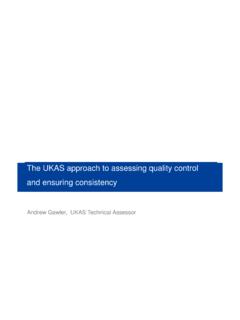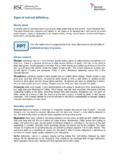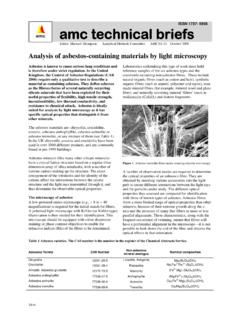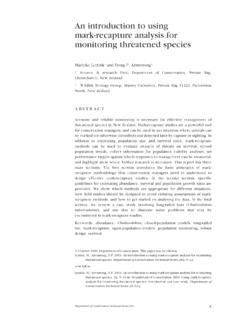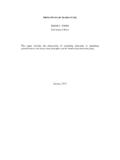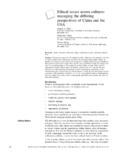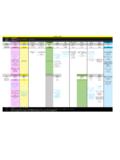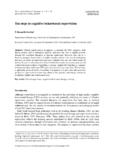Transcription of The role of laboratory work in university chemistry
1 Perspective The role of laboratory work in university chemistry Norman Reid1* and Iqbal Shah2 1 Centre for Science Education, university of Glasgow, Glasgow G12 8QQ, UK e-mail: 2 Open university , Islamabad, Pakistan Received 23 August 2005, accepted 9 February 2006 Abstract The place of experimental work in laboratories has always assumed a high profile at all levels of chemical education. This paper seeks to review the main strands of evidence available today and argues that the place of experimental work needs to be reconsidered at higher education levels. There is a need for a clarification of aims and objectives, and these need to be communicated to learners. It argues that higher education needs to be acutely aware of what goes on at school and to build on these skills. Pre- laboratory exercises are strongly supported by the evidence, while there needs to be a radical re-thinking of the use of laboratory manuals, with assessment being explored afresh.
2 In addition, seeing the laboratory experience in the context of what goes on before and after, as well as other learning, will enhance the learning potential of this time. Examples of some ways forward are presented. Overall, it is argued that much more could be gained by the students if the laboratory experience, using similar experiments, was radically re-thought. [Chem. Educ. Res. Pract., 2007, 8 (2), 172-185] Keywords: Higher education laboratory work , aims and objectives in laboratory instruction, pre- laboratory exercises, post- laboratory tasks Introduction laboratory work is an established part of courses in chemistry in higher education. The original reasons for its development lay in the need to produce skilled technicians for industry and highly competent workers for research laboratories (Morrell, 1969, 1972). Today, the aims may be different, in that many chemistry first degree graduates are not employed as bench chemists in industry (Duckett et al.)
3 , 1999; Statistics of chemistry Education, 2006), and the needs of research have inevitably become much more specialized as chemical knowledge has expanded. This paper seeks to offer an overview of the current situation in higher education, and explores what might be the aims for today. It also argues that laboratory work in higher education cannot be seen in isolation. For most students it follows school laboratory experiences which are rapidly changing, and has to relate to material taught in lectures and tutorials. However, of greater importance is the need to see the hands-on laboratory time as part of a wider process of learning. In this, there is a need to prepare students for their time in the laboratory as well as develop follow-up activities. Together, these may enrich and enhance the whole laboratory experience, and enable it to contribute more effectively to the overall learning of students in chemistry .
4 chemistry Education Research and Practice, 2007, 8 (2), 172-185 This journal is The Royal Society of chemistry and I. Shah 173 Historical perspective of laboratory work The first teaching laboratory in chemistry in Britain was established by Thomas Thomson in the university of Edinburgh in 1807. In 1819, he introduced this to the university of Glasgow, when he joined this university . In 1824, Liebig established a chemistry laboratory at the university of Giessen. This was a most exciting period of the nineteenth century. Liebig s was the first institutional laboratory in which students were deliberately trained for membership of a highly effective research school by means of systematic research experiments (Morrell, 1969, 1972). laboratory classes then gradually developed over the next fifty years until eventually, in 1899, it came to be considered necessary that school pupils be allowed to carry out experiments for themselves.
5 By this time, however, most schools in England had already adopted this way and regarded practical work as an essential requirement for science teaching in England (Gee and Clackson, 1992). Thus, practical training in chemistry sprang up in universities all over the Europe and North America. These were devoted to the teaching of skills directly used in industries and research (Letton, 1987; Johnstone and Letton, 1989; Khan, 1996). Practical work at this time played a vital role in confirming the theory which was already taught in the classroom. However, some doubts also arose about the efficiency of teaching through practical work in chemistry . This work in higher education had its impact on school teaching in the sciences. Here, a century ago Armstrong advocated the direct experimentation by the pupils rather than demonstration experiments performed by the teacher.
6 However, too much time was wasted on repetitive individual practical work (Hodson, 1990). Therefore, attention switched back once again to teacher demonstration. In 1932, the Education Board in England supported the same idea (pamphlet no. 89). This declared that there was too much practical work of the wrong kind .., too much remote from the natural interests and everyday experience of the children (cited in Hodson, 1993). In 1935, Schlensenger studied the contribution of laboratory work to general education. He noticed that students who had previously exhibited real interest in chemistry developed the habit of doing their experiments mechanically to get the result expected rather than to observe what is actually going on in their test tubes (Letton, 1987). Little seems to have changed since then. Towards the end of the twentieth century, more sophisticated alternatives had been introduced to facilitate effective learning in university laboratories.
7 These included pre- laboratory experiences, films, video experiments, computer based pre-laboratories, post laboratory exercises and computer simulations [see Carnduff and Reid (2003) for a review]. Bennett and O Neale (1998) proposed guidelines for the design of laboratory courses in chemistry in higher education in terms of the logical sequence of ideas, opportunity for real investigations very early in the course and pre- and post- laboratory sessions which actively engage the students . These principles reflect the ideas of Denis Diderot, the French philosopher, who outlined three principal means of acquiring knowledge available to us: observation of nature; reflection; experimentation. Observation collects facts; reflection combines them; experimentation verifies the results of that combination (cited in Lester, 1966).
8 All of these illustrate the need to decide what the aims are for using laboratory work in the teaching of chemistry in higher education. Why have laboratories? Laboratories are one of the characteristic features of education in the sciences at all levels. It would be rare to find any science course in any institution of education without a substantial component of laboratory activity. However, very little justification is normally given for their chemistry Education Research and Practice, 2007, 8 (2), 172-185 This journal is The Royal Society of chemistry and I. Shah 174 presence today. It is assumed to be necessary and important. It is taken for granted that experimental work is a fundamental part of any science course and this is especially true for chemistry courses. Very frequently it is asserted that chemistry is a practical subject and this is assumed, somewhat naively, to offer adequate justification for the presence of laboratory work .
9 Thus, the development of experimental skills among the students is often a suggested justification. Nonetheless, this argument needs to be questioned to justify the position or role of the laboratory in the field of chemistry education. One of the main reasons to question the place of laboratory teaching is that laboratory programmes are very expensive in terms of facilities and materials, but also, more importantly, in terms of staff time (Carnduff and Reid, 2003). university students reactions to practical work are often negative and this may reflect a student perception that there is a lack of any clear purpose for the experiments: they go through the experiment without adequate stimulation (see for example, Johnstone and Letton, 1988 and 1990). It is important to think about goals, aims and objectives in the context of laboratory work .
10 laboratory work here is used to describe the practical activities which students undertake using chemicals and equipment in a chemistry laboratory . Of course, the word practical can include other activities as well, and it is interesting to note the use of the word in so many titles in papers. However, this paper is discussing experimental activities conducted in the laboratory by students although other practical activities may have their place and be important. Many years ago in a schools context, Rose and Seyse (1974) raised a fascinating question: could many important aims still be attained even if practical work were abolished? They suggested that this depends partly on our view of science. Science can be seen as established human knowledge, a problem solving activity, or concerned with the relation between theory and experiments.
